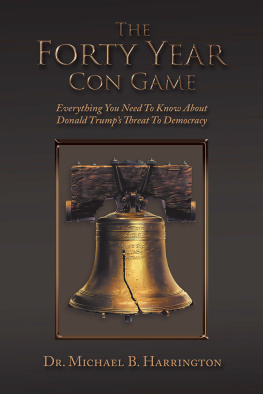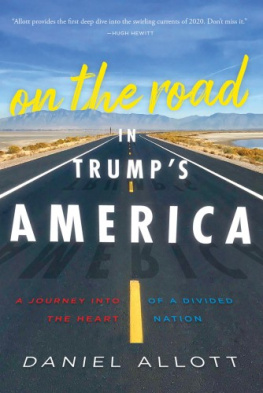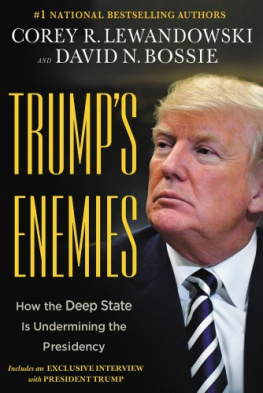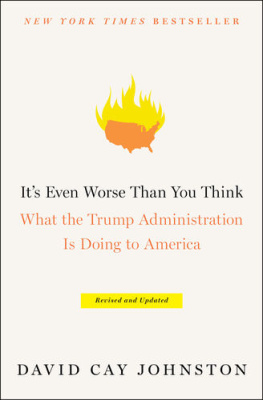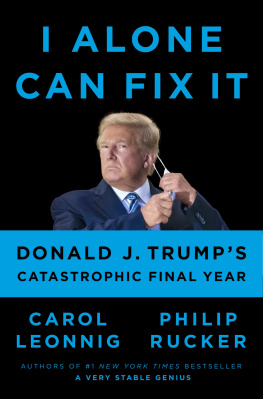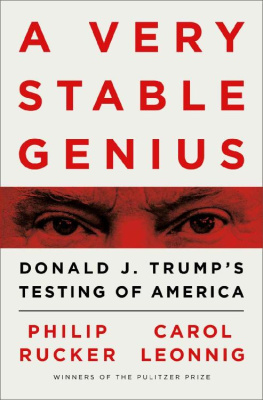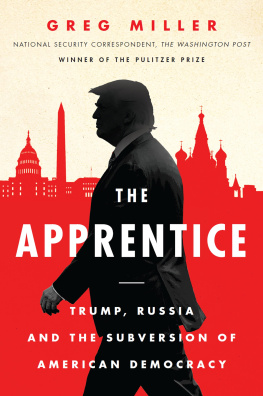THE FORTY YEAR
CON GAME
Everything You Need To Know About
Donald Trumps Threat To Democracy
Dr. Michael B. Harrington
Copyright 2019 by Dr. Michael B. Harrington.
Library of Congress Control Number: 2019909343
ISBN: Hardcover 978-1-7960-4584-0
Softcover 978-1-7960-4585-7
eBook 978-1-7960-4586-4
All rights reserved. No part of this book may be reproduced or transmitted
in any form or by any means, electronic or mechanical, including photocopying, recording, or by any information storage and retrieval system,
without permission in writing from the copyright owner.
Any people depicted in stock imagery provided by Getty Images are models,
and such images are being used for illustrative purposes only.
Certain stock imagery Getty Images.
Rev. date: 08/21/2019
Xlibris
1-888-795-4274
www.Xlibris.com
799167
CONTENTS
The U.S. Defense Department Office of Prepublication and Security Review evaluated this book on behalf of relevant U.S. intelligence agencies to ensure it contains no classified information. The Office cleared the book for publication.
It has been said that journalists play three crucial roles under the First Amendment of the U.S. Constitution to describe the world around us, to write the first draft of history, and to speak truth to power. Fulfilling these roles has always been challenging and all-too-frequently dangerous. During times replete with alternative facts and shrill cries of Fake News from those with much to hide, journalists are more important than ever. This book is dedicated to those devoting their lives to First Amendment roles and to give humble thanks for all they do.
CHAPTER ONE
The Implausible Candidate: Risks
Known But Discounted
Occasionally entertaining, often embarrassing, always opinionated, Donald J. Trump did nothing in his business career to warrant significant national attention. He was known for baseless, shoot-from-the-hip public comments; most observers viewed these outbursts as simply bids for attention.
Devoted to self-promotion throughout his life, Trumps public efforts have often been publicity stunts.
His disinterest in actual government affairs suggested he was another political dilettante, dabbling in current events to promote a personal agenda. His advanced age, his lack of knowledge of, and experience with, national government, his massive business failures, and his Selective Service deferments were telling. All suggested he would not become a serious candidate. Leaders in both national parties thought his playboy lifestyle, multiple marriages, quirky behavior, poor judgement, and business failures would make him unattractive to voters.
When he declared his candidacy on 16 June 2015, serious observers of national politics asked several questions:
Was Trump really a successful businessman?
Did Trump have a coherent overall vision for America?
Was Trump serious about running for president?
Was Trumps most revealing campaign promise a warning?
Could Trump create a Trump-favorable environment?
What were likely consequences of this environment?
Could Trump be trusted in public office?
Trump had long claimed that he was an extremely successful businessman. He frequently claimed that he borrowed a million dollars from his father, used it to build a business worth billions of dollars, and paid back the loan. If elected, he would run the federal government like a business, drawing upon these skills. Aspiring political candidates have made similar claims for decades, of course, but most knew government is not like a business in fundamental ways. Being good at one does not assure success at the other.
That aside, Trumps claim might have validity if his up-by-his-boot-straps claim were true, and if he were a business success. Neither was true. His father was far more generous than Trump claims. Moreover, Trump the son had a long history of business failures. Heres a partial list of his failures in rough chronological order:
Trumps father, Fred Trump, spent a lifetime accumulating wealth using shady real estate business practices and dubious tax dodges. He used this wealth to provide Donald Trump and his siblings when children with $413 million (in current dollars) as starter money.
Trumps United States Football League (USFL) football franchise, the New Jersey Generals , (1982-86) folded when Trump pressured other USFL owners to compete head-to-head with the long-established NFL. The USFL collapsed due in large measure to Trumps impatience and poor business sense.
In the mid-1980s, Trump attempted to be a corporate raider, sending green mail to Holiday Corporation, Allegis Corporation, and Federated Department Stores simulating his hostile takeover attempt to artificially manipulate his personal stock holdings. He was soon detected by other traders. The practice was later abandoned by the Wall Street because of the damage it produced among stable companies.
Trump Shuttle Inc. connecting Washington D.C., New York, and Boston by air (1989-1990) never turned a profit. Trump defaulted on loans totaling $380 million he had used to convert Eastern Airlines and to the Trump Shuttle in 1990.
Trump purchased the Princess, then the worlds biggest yacht, with borrowed money (1990-1991) but could not make payments. This yacht was sold by Trumps creditors to Prince Alwaleed bin-Talal, a Saudi Arabian prince (among Trumps first Saudi benefactors) for $20 million.
Trump financed the purchase of Taj Mahal Hotel and Casino in Atlantic City, NJ with high interest junk bonds in the early 1990s, but these bonds defaulted in 2009. Trump cheated contractors out of $60 million on this project. Atlantic Plate Glass alone lost $500,000 at settlement of the lawsuit.
Plaza Hotel in New York City (1992). Trump purchased the hotel with borrowed money he could not repay. He was forced to sell it later to three Saudi princes at an $83 million loss.
Trumps Taj Mahal was charged with violating anti-money laundering regulations 106 times during the 1990-91 period by failing to file timely reports on gamblers who bought or cashed out $10,000 in chips to launder money. Trump was fined $477,000 by the Treasury Department for this offense.
At this point, Trumps overleveraged real estate and gambling empire faced serious financial trouble. The Trump Organizations own accountants showed that only three of his twenty-two assets were profitable. Moreover, these accountants estimated his net worth at negative $295 million.
In 2001, Trump avoided bankruptcy by selling the entire 45 th floor of Trump Tower to a Saudi Arabian interest, another example of Saudi bailouts for Trump.
Trump Hotels and Casino Resorts, including the Trump Taj Mahal, the Trump Marina, the Trump Plaza in Atlantic City, NJ, and a casino in Gary, Indiana all failed in 2004. Financed by a publicly traded company called DJT, the companys investors lost everything.
Trumps father had bailed him out on at least three occasions with multi-million-dollar loans.
DJTs reorganized successor, a company with public shares, also went broke in 2009. DJTs public shareholders again were wiped out.
Trump hosted The Apprentice TV show (2004-2011), a reality show where his personal eccentricities, bluster, and inability to prepare were continually hidden by judicious editing. The show nonetheless had good ratings and an estimated income of 65 million dollars over its run.
Trump University claimed to teach students the secrets of real estate success. It was forced to change its name, and then close, since it was not a university as defined by New York state (2005).
Trump Premium Vodka (2006-2011) was discontinued due its failure to meet threshold requirements.
For American Communications Network (2006-2011), Trump made videos to promote ACNs alleged revolutionary technology products but the company sold videophones for which there was little demand. The ACN business plan proved to be largely indistinguishable from an illegal pyramid scheme. ACN went bankrupt.
Next page
